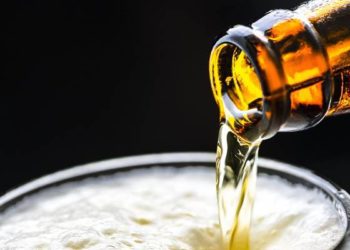Stronger alcohol policies linked to decreased youth drinking
1. Stronger population-wide and youth-targeted alcohol policies were associated with reduced likelihood of youth alcohol consumption.
2. Adult alcohol consumption may mediate the relationship between population-wide policies and youth drinking.
Evidence Rating Level: 2 (Good)
Study Rundown: Alcohol is the most commonly used drug among adolescents and is the direct or contributing cause in a large number of deaths annually. While legislation targeted to adults and youth exist, it is unclear how these formal policies influence adolescent alcohol consumption. Alcohol policies vary between states, though most states employ youth-targeted and population-wide policies. This study sought to examine the potential relationship between policy type and youth drinking.
A panel of experts examined alcohol policies and assigned them scores in an attempt to characterize the policy environments of each state. These scores were then compared to youth drinking survey data as well as state-wide consumption data. The authors found an inverse relationship between the state-level alcohol policy score and the odds of youth drinking, suggesting stronger alcohol policies decrease youth drinking. In addition, they found that both population-wide and youth-specific policies were associated with youth drinking. This relationship held true across different ages, sexes, and select racial and ethnic youth groups. Evaluation of the association between population-level policies, adult consumption and youth consumption suggested that adult drinking mediated the effect of population-level policies on youth.
The study was robust in its comparison of alcohol policy scores to youth consumption, however, it relied on experts to assess the efficacy and implementation of alcohol policies. In addition, there was no data available regarding enforcement of policies, which may vary greatly between states.
Overall, this analysis suggests that stronger population-level and youth-targeted alcohol policies may be effective in reducing youth drinking.
Click to read the study, published today in Pediatrics
Relevant Reading: Tax policy, adult binge drinking, and youth alcohol consumption in the United States.
In-Depth [retrospective cohort]: This study used an expert panel to create alcohol policy scales (APS) based on 29 alcohol policies in use the United States. These scores were then combined to represent an alcohol policy environment for each state. The authors used 7 years of survey data (obtained between 1999 and 2011) on youth drinking from Youth Risk Behavior Surveys, a Centers for Disease Control survey targeted at representative samples of students in ninth through twelfth grade. Adult per capita alcohol consumption from the Alcohol Epidemiological Data System (AEDS), based on alcohol sales and tax receipts, was obtained. APS scores were then compared to the survey data and AEDS data in order to examine the affect of policy strength on youth and adult consumption. A 10-percentage point increase in APS score was associated with reduced likelihood of youth drinking (AOR 0.92; 95% CI 0.90-0.95) and youth binge drinking (AOR 0.93, 95% CI 0.91-0.96). This was true for the subgroups of gender, grade, non-Hispanic white youth and Hispanic youth. However, there was no association between APS score and drinking for non-Hispanic black youth or non-Hispanic other youth. Specifically, for population-oriented policies, there was also a significant reduction in youth drinking with a 10-percentage point increase in APS score (AOR 0.93, 95% CI 0.92-0.97). This was also true for youth-oriented policies (AOR 0.96, CI 0.96-0.99).
The effect of population-level policy on youth drinking was moderately decreased after controlling for adult drinking (AOR 0.96, 95% CI 0.93-0.98), suggesting that adult consumption may mediate the effect of population-level policies on youth.
Image: PD
©2015 2 Minute Medicine, Inc. All rights reserved. No works may be reproduced without expressed written consent from 2 Minute Medicine, Inc. Inquire about licensing here. No article should be construed as medical advice and is not intended as such by the authors or by 2 Minute Medicine, Inc.







